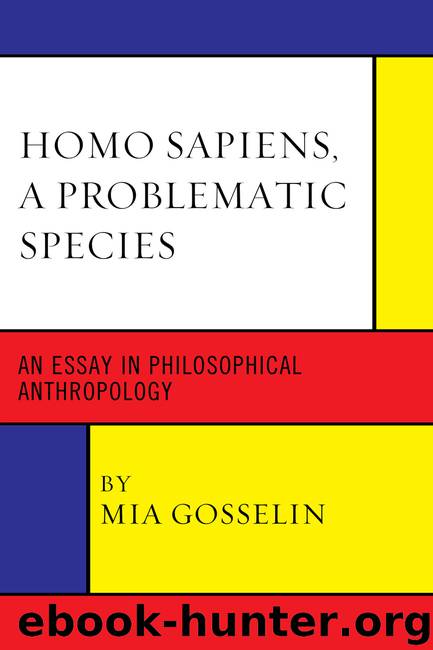Homo Sapiens, A Problematic Species by Gosselin Mia

Author:Gosselin, Mia
Language: eng
Format: epub
ISBN: 9780761865209
Publisher: University Press of America
The Renaissance
The immortality of the soul in Renaissance philosophy.
In the fourteenth century Ockham introduced the “via nova,” and was of great influence, while others, and curiously amongst them Platonists, continued after him what Gordon Leff has called “the dissolution of medieval thought.” In Leff’s opinion there is no real continuity between the thirteenth and fourteenth century. Perhaps, defining the Renaissance negatively as a mainly cultural, far more than a new social, economical or even political phenomenon, which consists in the rejection of the traditional medieval scholastic approach of man and nature, we could say that the true break must be situated in the fourteenth rather than in the fifteenth century. After the first enthusiasm about the Renaissance as a period literally of rebirth, which was inspired by Jacob Burckhardt, the opinions became more shaded and it was generally accepted that it was at the same time a continuation of the Middle Ages and a genuine new era as well. In the fourteenth century Ockham paved the way for scientific physics, and suggested that another world such as ours was possible. In the fifteenth century, Nicolas of Cusa introduced a totally new picture of the universe. Instead of consisting of a number of spheres, with the earth snugly situated in its centre, he dared to picture it as infinite, with its centre, and in consequence its circumference, everywhere and nowhere. Filippo Lippi, a contemporary of Nicolas of Cusa, painted nevertheless about the same time a wonderfully reassuring cosmology on the cupola of the cathedral of Spoleto. We can admire a world layered like of old, each kind of reality in its natural place and all of them harmoniously related to the encompassing whole. It is clear old and new world views existed simultaneously.
What does this imply for the concept of man? We can without hesitation say that in the Renaissance the picture of the world changed more radically than that of man. Nevertheless, the interpretation of characteristics unique to man and lending “humanitas” to all of us, generally recognised by the Schoolmen teaching at Universities, became different. The humanity of men is no longer the sole responsibility of God and a reflection of an eternal model. Individuals are no longer determined by the essence “man,” present in the divine mind. On the contrary, each person individually, has to decide what will become of him. Each man, as so often repeated, being a “microcosm in the macrocosm,” has gained autonomy and has become for himself the centre of the world. In fact, under the influence of the study of the Ancients, the individual, though owing his existence ultimately to God, marvels at himself. Man has gained a new dignity, in summa: he is magnificent. He is part of nature, but also opposed to it; he is able to tame it like he can tame wild animals. It is his prerogative to turn nature into an object for his subjectivity, which means that he can enjoy it, can study it and can dominate it.
Download
This site does not store any files on its server. We only index and link to content provided by other sites. Please contact the content providers to delete copyright contents if any and email us, we'll remove relevant links or contents immediately.
| Deconstruction | Existentialism |
| Humanism | Phenomenology |
| Pragmatism | Rationalism |
| Structuralism | Transcendentalism |
| Utilitarianism |
The remains of the day by Kazuo Ishiguro(9000)
Tools of Titans by Timothy Ferriss(8398)
Giovanni's Room by James Baldwin(7347)
The Black Swan by Nassim Nicholas Taleb(7132)
Inner Engineering: A Yogi's Guide to Joy by Sadhguru(6797)
The Way of Zen by Alan W. Watts(6615)
The Power of Now: A Guide to Spiritual Enlightenment by Eckhart Tolle(5785)
Asking the Right Questions: A Guide to Critical Thinking by M. Neil Browne & Stuart M. Keeley(5776)
The Six Wives Of Henry VIII (WOMEN IN HISTORY) by Fraser Antonia(5516)
Astrophysics for People in a Hurry by Neil DeGrasse Tyson(5191)
Housekeeping by Marilynne Robinson(4449)
12 Rules for Life by Jordan B. Peterson(4307)
Ikigai by Héctor García & Francesc Miralles(4275)
Double Down (Diary of a Wimpy Kid Book 11) by Jeff Kinney(4273)
The Ethical Slut by Janet W. Hardy(4258)
Skin in the Game by Nassim Nicholas Taleb(4250)
The Art of Happiness by The Dalai Lama(4131)
Skin in the Game: Hidden Asymmetries in Daily Life by Nassim Nicholas Taleb(4007)
Walking by Henry David Thoreau(3963)
